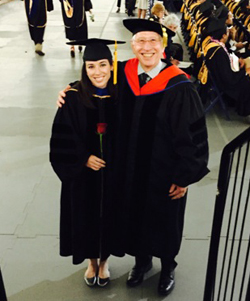Dr. Grant celebrates awarding of PhD in Clinical Psychology to graduate student Jordan Cattie on June 14, 2015

Dr. Grant celebrates awarding of PhD in Clinical Psychology to graduate student Jordan Cattie at the UCSD ceremony on June 14, 2015. The newly minted Dr. Cattie distinguished herself during her graduate training by conducting an innovative study on social cognition in relation to HIV infection and methamphetamine abuse among participants in the UCSD HIV Neurobehavioral Research Program. Dr. Grant served as Jordan's Guidance Committee and Dissertation Committee Chair. Dr. Cattie heads to a postdoc fellowship at the Harvard affiliated McLean Hospital, and then will be applying for a position at Emory University.
Congratulations Jordan!
Igor Grant Announced as New Chair of the Department of Psychiatry, University of California, San Diego
This message was sent on behalf of Dr. David Brenner, Vice Chancellor, UC San Diego Health Sciences and Dean of the School of Medicine, and Paul Viviano, Chief Executive Officer, UC San Diego Health System, to UC San Diego Health Sciences Faculty and Staff.
We are pleased to announce that Igor Grant, MD, FRCP(C), an internationally recognized neuropsychiatrist, has been named the new Chair of the Department of Psychiatry at UC San Diego School of Medicine. Dr. Grant has been at UC San Diego more than 40 years and has served as Executive Vice Chair in the department for the past 20. He will succeed Lewis Judd, MD, who is stepping down after 36 years in the position – the longest serving department chair in the history of the university.
Dr. Grant takes the reins of a psychiatry department that consistently has been highly ranked nationally, with a research and clinical faculty second to none. Over the years, Dr. Grant has been an essential contributor to much of that achievement, holding a variety of leadership positions.
Previous SDSU/UCSD JDP graduate appointed as Fellow to the Canadian Academy of Health Sciences

This award was in recognition of his work transforming how population health and community-based research is done to have a stronger impact on policies and front-line services, and to solve complex health problems for people living with or at risk for HIV/AIDS.
Dr. Rourke worked closely with Dr. Igor Grant during the formative years of his career and was a graduate of the San Diego State University/University of California, San Diego (SDSU/UCSD) Joint Doctoral Program (JDP) in Clinical Psychology.
Click Here for more information regarding Dr. Rourke.
HNRP Investigators Participated in "Neuroscience and HIV-Infection" International Conference in Russia

HNRP Investigators Presented at the North European Workshop on HIV infection in the CNS (HANSA 2013)
Presentation: HAND is Common and Important in Patients on ART, Igor Grant, MD (PDF)
Drs. Igor Grant and Scott Letendre presented at the third North European Workshop on HIV–infection in the central nervous system (HANSA 2013) that took place in Berlin, Germany, 26-27 April 2013. The aim of HANSA 2013 is to assemble clinicians and researchers together to advance knowledge of ongoing HIV central nervous system (CNS) research. The conference covered basic issues and controversies.
Page 5 of 7







